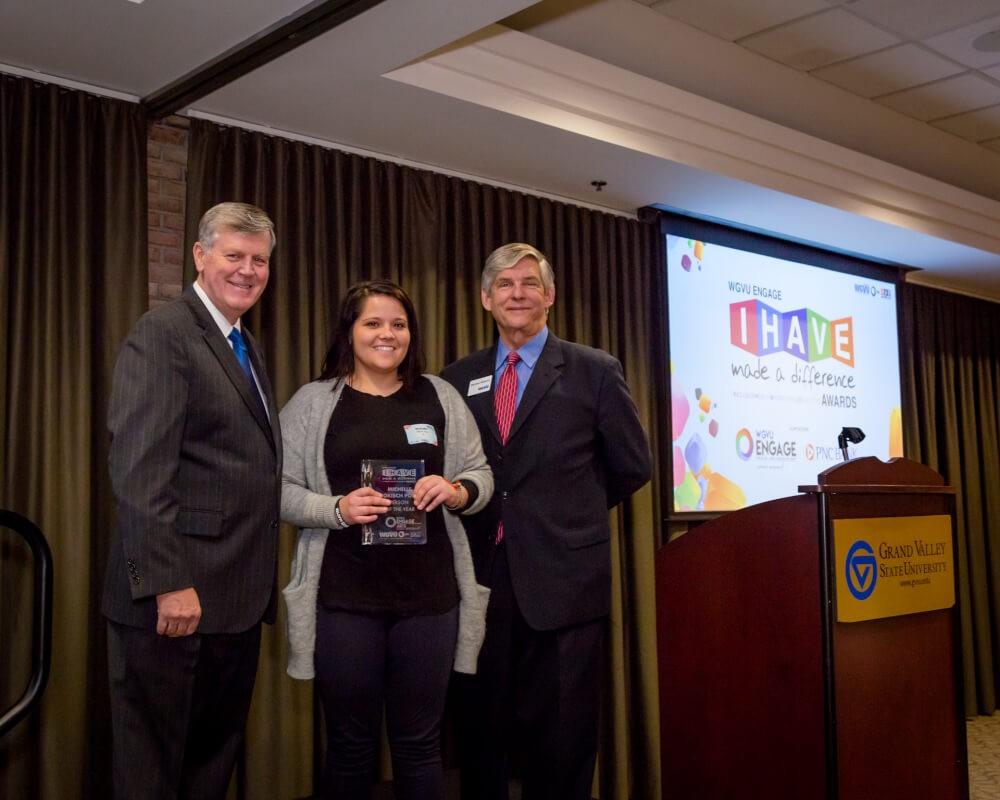WGVU General Manager to receive Lifetime Achievement Award

Courtesy / Gvsu.edu
Jul 8, 2018
The Michigan Association of Broadcasters recently made the decision to present long time WGVU General Manager Michael Walenta with a Lifetime Achievement award, recognizing him for his impact on the world of broadcasting. The MAB describes the award as the highest award they give, meant for those who have “dedicated the majority of their careers to broadcasting in the state of Michigan.” Only one person receives the award each year.
Walenta has been with WGVU Public Media more than 30 years and will receive the award in August. Tim Eernisse, Director of Development and Marketing for WGVU, said Walenta’s experience in broadcasting led to him being chosen as the award’s recipient, as well as his local and national impact.
“He really deserves it,” Eernisse said. “When we submitted him (for the award), we felt that he epitomized what it meant to have a lifetime of achievements that were worthy of being recognized by the MAB. I spoke with their board of directors and they agreed with our sentiment and agreed that he was an absolutely worthy candidate for this award.”
Despite Eernisse’s praise, Walenta remained steadfast and humble in his gratitude for those at WGVU who played a role in his success.
“At the end of the day, I wanted it for the team,” Walenta said. “I didn’t want it for me. I tried to give it back and say, ‘you need to give it to the team, because it’s a team effort.’
“I don’t know anybody who gets an award all by their lonesome.”
As a former student of Central Michigan University, Walenta got his start in broadcasting at WCMU in Mount Pleasant, Michigan. For a time during grad school, he worked at WOTV in Grand Rapids and after a change in the station’s ownership, he was asked to move to Austin, Texas. His work took him all across the southwest before finally returning to Michigan in 1988 to begin his career with WGVU.
Walenta’s receiving of the award also happens to coincide with his retirement. Eernisse says he didn’t know this when he submitted him for the award but feels that it’s appropriate timing.
“It’s very fitting,” he said. “It’s kind of the perfect send-off for him in his retirement to say, ‘thank you for all you’ve done for public media.’”
WGVU has grown steadily over the years, helped along by many individuals, including former Grand Valley State University president Don Lubbers. Walenta has overseen plenty of that growth, contributing to major moves such as the acquisition of more television and radio stations and a large switch from analog to digital broadcasting in many of WGVU’s stations.
“I’ve always maintained that we, WGVU, whether it’s the AM, the TV, or the FM stations; we’re in the program delivery business,” Walenta said. “That’s the real big thing we do, so the more ways we have to deliver those programs, the better.”
Aside from just broadcasting content from NPR and popular PBS shows, WGVU also has a long history of influencing GVSU and the surrounding communities. Students regularly participate in the production of a news show titled West Side Stories that airs through WGVU and have found many other opportunities throughout their involvement there as well.
“We average probably 30 to 50 students a year that come through WGVU Public Media, and a lot that have started their careers at WGVU,” Eernisse said. “They’ve gone on to all kinds of things across the country. Michael is the one that led that charge, continually reinforcing the idea that the most important thing we can do is help serve the students and get them ready for their careers. That just shows you the type of person he is.”
Walenta hopes that WGVU’s tradition of serving the community will continue long after he is gone. However, he thinks they will eventually need to adapt to the changing media climate in order to maintain their same level of success.
“I think whether it’s WGVU or any four call-letters in the country, it’s key to be able to be nimble and proactive for the program delivery services that are going to become available,” Walenta said. “The usual follow up question to that is ‘what kind of changes?’, and the answer is that I don’t know. Nobody really knows where this is going right now; you can get everything you want now on your phone or on your tablet. You’ve gotta be flexible, but you’ve gotta be true to your core beliefs, which (for us) is to deliver the kind of content that PBS and NPR have always delivered.
“It’s an exciting time to be in broadcasting.”






















